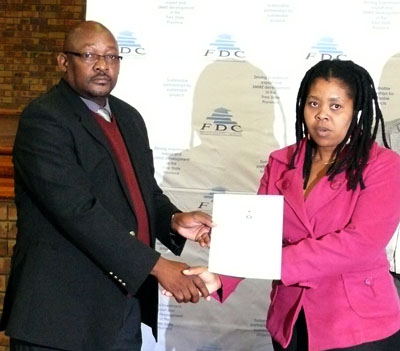 |
| Dr Elias Malete, Campus Principal, with Ms Makakane |
Christmas came early for the student community of the University of the Free State (Qwaqwa Campus). This after the Chairman of the Phuthaditjhaba-based Salemane Holdings, Mr Mei Salemane, announced a three-year sponsorship deal for the campus’ Student Affairs Excellence Awards during the prestigious awards ceremony held recently.
“We fully understand from experience that a lot of young people are from disadvantaged families, which hamper their development in most cases. We are not any different from them; that is why we vow to make a difference by pledging our support by sponsoring these awards for the next three years at a tune of R150 000 annually,” said Mr Mei whilst handing over cash prizes to the value of R28 000 to the best-performing students in the four faculties.
In response, the Director of Student Affairs, Mr Teboho Manchu, acknowledged the role that local businesses can play in supporting higher education.
“We wish to thank Salemane Holdings and other sponsors for giving recognition to young men and women for their achievements,” concluded Manchu.
Awards issued on the day covered a wide range that included academic performance as well as for sporting and cultural excellence.